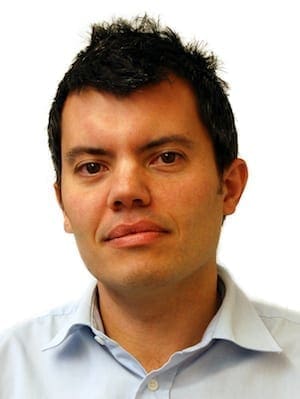Baptists in Europe and the Middle East who are involved in the response to the refugee crisis are seeing an “incredible spiritual harvest.”
Yet, there is a sense of anger, of being overwhelmed at its scale, and warnings about the growing pressure in places affected by the blockage of refugee routes, such as Italy, Greece and Turkey.
These were some of the themes to emerge as representatives of Baptists in Lebanon, Croatia, Sweden and Germany gave updates on the refugee situation at the European Baptist Federation (EBF) Council in Tallinn, Estonia, from Sept. 28 to Oct. 1.
In his annual report, EBF General Secretary Tony Peck outlined how the previous 12 months had been “dominated” by the response to the crisis.
An EBF refugee working group created a mapping document detailing how Baptist churches across the region have been responding. The group also helped member unions in Turkey, Serbia and Ukraine to access funding.
Rupen Das, a member of the working group, explained how an “incredible spiritual harvest” was taking place, due to churches offering hospitality and compassion.
He said the crisis of northern Europe has passed, and the focus of the churches is on integration.
However, he warned that another wave is building up, caused by the blocking of the Balkans route. Pressure is growing in Italy, Greece, Serbia and Turkey.
Das also noted that the refugee response wasn’t just about Syria – Baptist churches in Ukraine were still ministering to many people displaced by the ongoing conflict in the east of the country.
A number of member unions brought news from their own countries.
Rabih Wazir, general secretary of the Convention of the Evangelical Baptist Churches in Lebanon, described how people from Syria had been overwhelmed by the humanitarian response of the churches and wanted to know more. It proved to be a good witness, and many are coming to Christ.
However, Lebanon is a small country that doesn’t have enough for everyone. “We are happy as small Baptist churches that we can help. We can help support, pray, but it’s not enough,” he said.
Wazir’s thoughts had been echoed by Nabil Costa the previous day, who had been invited to give a reflection on the Middle East.
Costa is executive director of the Lebanese Society for Educational and Societal Development and serves on the EBF executive committee.
“How long can we keep doing this?” he asked. “I think collectively as Baptists … we need to move forward with advocacy rights.”
Baptists in Croatia have been inspired by the Lebanese response, Toma Magda said.
The Baptist Union of Croatia formed itself into a nongovernmental organization to help refugees passing through the transit camp in Slovanski Brod.
When the border closed, it moved its support to the refugee camps in Greece. But these camps are harsh, unhygienic places run by police and army, and their continuing existence makes him “emotional, angry.”
“Nothing has changed,” Magda said. “The only good news is that Jesus Christ died on the cross.”
“Overall, there are many challenges, but also blessings,” said Joachim Gnep of the Union of Evangelical Free Churches in Germany.
Responding to the influx of refugees had changed their churches; they have had to network better, and it has widened their view of the global village.
However, the country was experiencing “fear of the stranger,” a particular catalyst being the New Year’s Eve assaults in Cologne. Support for right-wing parties was growing.
The union’s theme for 2015-16 had been “Colorful Church,” about the amazing diversity in Christ. It had also given many of its churches training on welcoming the stranger.
Around half of the 300 member churches of the Interact Evangelical Free Church in Sweden are active in refugee work, said Daniel RÃ¥sberg.
Most are hosting language courses; some are meeting refugees; others are opening up their buildings to host activities such as knitting.
The interaction has “raised up the church in Sweden to a new way of sharing the gospel,” he said. For instance, young Christians are learning Arabic to communicate with the people they are encountering.
As a result, “I have seen people come to Christ more often than I have ever done in my life,” RÃ¥sberg stated. “One of our churches didn’t have a single black hair; now 35 percent of its congregation is Arabic-speaking people.”
By contrast, he shared his disappointment at the response of his government, which has now shut its borders and changed laws to stem the flow of refugees.
In the previous year, 160,000 refugees came to Sweden, of whom 60 percent were unaccompanied children.
“Last year, I could boast about our country,” RÃ¥sberg said. “Now I am ashamed.”
Elsewhere, there was a resolution and an appeal made in support of the response of the Baptist Alliance of Turkey to the Syrian refugees in their country.
 Paul Hobson is editor of The Baptist Times of Great Britain – the online newspaper of the Baptist Union of Great Britain. A longer version of this news article first appeared in The Baptist Times and is used with permission. You can follow him on Twitter @PaulHobson10, The Baptist Times @BaptistTimes and the Baptist Union @BaptistUnionGB.
Paul Hobson is editor of The Baptist Times of Great Britain – the online newspaper of the Baptist Union of Great Britain. A longer version of this news article first appeared in The Baptist Times and is used with permission. You can follow him on Twitter @PaulHobson10, The Baptist Times @BaptistTimes and the Baptist Union @BaptistUnionGB.
Editor’s note: Other articles written by Hobson about the 2016 EBF council meeting are available here.
Paul Hobson is editor of The Baptist Times of Great Britain, the online newspaper of the Baptist Union of Great Britain.

